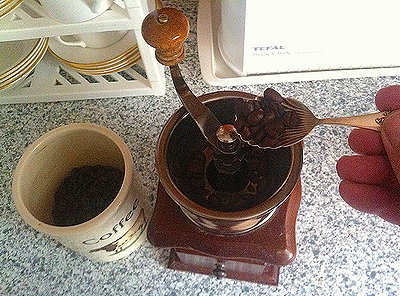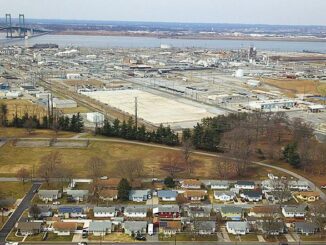
SOPHIA ANTIPOLIS, France, October 2, 2022 (ENS) – Drinking two to three cups of coffee every day is linked with a longer lifespan and lower risk of heart disease and stroke compared with avoiding coffee, finds research published in the current issue of the “European Journal of Preventive Cardiology.” The peer-reviewed findings applied to ground, instant and decaffeinated coffee products.
“In this large, observational study, ground, instant and decaffeinated coffee were associated with equivalent reductions in the incidence of cardiovascular disease and death from cardiovascular disease or any cause,” said study author Professor Peter Kistler of the Baker Heart and Diabetes Research Institute in Melbourne, Australia.
“The results suggest that mild to moderate intake of ground, instant and decaffeinated coffee should be considered part of a healthy lifestyle,” Dr. Kistler advised.
This study examined the links between types of coffee and incident arrhythmias, cardiovascular disease and death using data from the UK Biobank, which recruited adults between 40 and 69 years of age. Cardiovascular disease was comprised of coronary heart disease, congestive heart failure and ischaemic stroke.

The study included 449,563 participants free of arrhythmias or other cardiovascular disease at baseline. The median age was 58 years and 55.3 percent were women.
Participants completed a questionnaire asking how many cups of coffee they drank each day and whether they usually drank instant, ground (such as cappuccino or filtered coffee), or decaffeinated coffee.
They were then grouped into six daily intake categories: none, less than one, one, two to three, four to five, and more than five cups per day.
Instant coffee was most popular with 44 percent of the 349,053 coffee-drinking participants, 0nly 18.4 percent drank ground coffee and just 15.2 percent chose decaf.
There were 100,510 non-coffee drinkers who served as the comparison group.
Coffee drinkers were compared to non-drinkers for the incidence of arrhythmias, cardiovascular disease and death, after adjusting for age, sex, ethnicity, obesity, high blood pressure, diabetes, obstructive sleep apnea, smoking status, and tea and alcohol consumption.
Outcome information was obtained from medical records and death records. The median follow up was 12.5 years.
A total of 27,809, or 6.2 percent of the participants died during follow up. All types of coffee were linked with a reduction in death from any cause.
The greatest risk reduction seen with two to three cups per day. Compared to those who drank no coffee, two to three cups a day was associated with a 27 percent lower likelihood of death for those who drank ground coffee, 14 percent for those who drank decaf, and 11 percent lower likelihood of death for the instant coffee drinkers.
Cardiovascular disease was diagnosed in 43,173, or 9.6 percent of participants during follow up. All coffee subtypes were associated with a reduction in incident cardiovascular disease.
Again, the lowest risk was observed with two to three cups a day, which compared to abstinence from coffee was associated with a 20 percent reduced likelihood of cardiovascular disease for drinkers of ground coffee, nine percent for instant and six percent for decaf.
An arrhythmia, or irregular heartbeat, was diagnosed in 30,100 participants, or 6.7 percent. Ground and instant coffee, but not decaffeinated, was associated with a reduction in arrhythmias including atrial fibrillation.
Compared with non-coffee drinkers, the lowest risks were observed with four to five cups a day for ground coffee and two to three cups a day for instant coffee.
Professor Kistler said, “Caffeine is the most well-known constituent in coffee, but the beverage contains more than 100 biologically active components. It is likely that the non-caffeinated compounds were responsible for the positive relationships observed between coffee drinking, cardiovascular disease and survival. Our findings indicate that drinking modest amounts of coffee of all types should not be discouraged but can be enjoyed as a heart-healthy behaviour.”
To date, there has been little information on the impact of different coffee preparations, but in 2018 a Harvard study produced similar findings. The Harvard scientists found that, “People who drink up to eight cups of coffee per day may slightly lower their risk of early death compared with non-drinkers.” Again, the longevity occured whether the coffee of choice was caffeinated or decaf, brewed or instant.
This study analyzed data from half a million Britons. The more coffee these people drank, the lower their risk of dying during the 10-year study period. Drinking eight or more cups a day was linked with 14 percent lower risk compared with not drinking any coffee.

“There are many potential beneficial compounds in coffee,” said nutrition expert Edward Giovannucci, professor of nutrition and epidemiology at Harvard T.H. Chan School of Public Health, in a July 2, 2018 interview on Boston Public Radio WBUR. “People think of caffeine, but it’s likely that some of the most beneficial compounds are not the caffeine.”
Nutritionist Kris Gunnars, writing on “HealthLine” in 2019, said, “Coffee is a rich source of antioxidants. If you don’t eat many fruits or vegetables, it may be one of the largest sources of antioxidants in your diet.”
In 2012, scientists at the University of Washington in Seattle and Guangdong Medical College in China published one of the first studies showing that caffeine extends life span, improves healthspan, and delays age-related disease. The study was conducted on Caenorhabditis elegans, a species of nematode commonly called roundworms.
They write, “Caffeine is the most widely used psychoactive drug worldwide.” Later in the study, they write, “Chronic, moderate consumption of caffeine has been linked with reduced risk of age-associated neurodegenerative disorders in humans, including dementia, Alzheimer’s disease, and Parkinson’s disease.
And in 2007, U.S. National Institutes of Health research published in the “New England Journal of Medicine,” showed that people who drank four or five cups of coffee a day tended to live longer than those who drank a cup or less.
Research on coffee and human health continues today and even more is called for. In August, a study published in the journal “European Urology Oncology,” led by Dr. Justin Gregg at the University of Texas MD Anderson Cancer Center, found that, “Coffee contains numerous plant-derived antioxidant and bioactive compounds known to lower systemic inflammation. Coffee therefore offers the potential to impact the progression of solid malignancies, and its intake has been associated with lower rates of colorectal cancer recurrence and related mortality.”
“Higher coffee intake has been linked to lower prostate cancer risk, although few studies have evaluated associations between coffee intake and survival following prostate cancer diagnosis.”
Featured image: Coffee at sunrise. December 2020 (Photo by Angela with Coffee-Rank.com)



